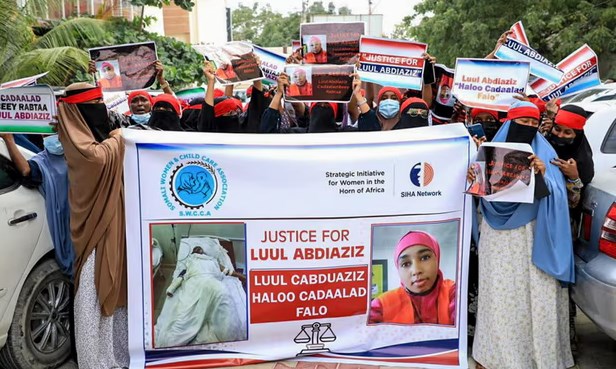
Naima Said Salah in Mogadishu
Tuesday February 13, 2024

Protesters in Mogadishu holding posters of Lul Abdi Aziz Jazira, who died after being set on fire. Photograph: The SIHA Network
The deaths of three women in one week, all allegedly murdered by their husbands, has caused outrage in Somalia and sparked days of protests over the country’s femicide rates.
Police have named the suspects in all three killings, which took place in the first week of February, as the dead women’s husbands. Two of the victims were pregnant. Even in a country where – after more than three decades of conflict – death and violence are part of everyday life, there have been demonstrations in the capital, Mogadishu, with protesters holding up placards showing photos of Lul Abdi Aziz Jazirain her hospital bed. The 28-year-old had been doused with petrol and set alight. She suffered severe burns and survived in agony for seven days after being attacked.
Her brother, Amudi Abdi Aziz Jazira, said neighbours had heard a “ferocious argument” and later broken down a locked door to reach the badly burned woman and take her to hospital.
Jazira, 28, was a widow with six children when she met her second husband at the airport in Mogadishu where she worked.
“I thought they were a happy couple,” said her brother.
A police spokesperson, Sadiq Dudishe, said the suspect had gone to an area where there was heavy fighting between the government and the Islamist group Al-Shabaab, which has controlled much of Somalia for 17 years.
“This made it difficult to catch him,” said Dudishe. “The intense insecurity meant it took time for us to find and arrest him.” A man is now in custody in Mogadishu.
In the southern district of Qoryoley, Saleban Haji Abdi has been arrested and charged with stabbing 22-year-old Fus Mahfud Mohamed to death. He is alleged to have attacked his wife of seven years, who was pregnant with her fourth child, on 3 February.
Mohamed’s father, Mahfud Mohamed Haji, said disputes between the couple had been previously dealt with by their families through Somali customary law known as xeer.
“I consistently provided mediation using our traditional system,” said Haji. “But the arguments didn’t stop and eventually I distanced myself from them.”
He was unable to get to his daughter’s funeral because of the recent floods which had destroyed the roads.
Police claimed the time and location of the murder had been meticulously planned by the killer, who cut Mohamed’s body into pieces.
The third woman to die has not been named, but police allege a woman was shot by her husband in Lower Shabelle, southern Somalia.
On 4 February, another man was arrested in the town of Afgoye, near Mogadishu, outside his family home in possession of gasoline and matches. Police said neighbours intervened in what appeared to be an attempt to set his wife and children on fire.
The chair of the Somali Women Development Centre, Maryam Taqal Huseina, said protests would continue until there was justice for the three women.
“Women are expected to be silent in Somalia,” she said, adding that she thought these women were murdered in order to shut them up. “We are going to continue to make noise until there is change,” she said.
Huseina said many people, especially men, either supported or accepted domestic violence and other forms of abuse against women as part of everyday life.
“With the advent of social media, new forms of abuse are on the increase including girls being blackmailed after being drugged and filmed while they are being raped, sometimes by more than one person. Some of these videos are sold on social media platforms.”
The governor of Mogadishu’s Benadir district, Yusuf Husain Jimale, has promised that Jazira’s children will receive financial support but there are concerns the authorities are not doing enough.
There is no specific law in Somalia against domestic violence.
In 2018, a comprehensive UN-backed sexual offences bill was introduced but it has not yet been passed by parliament. In 2020 a new sexual intercourse related crimes bill was proposed, which relaxed current age restrictions to allow for marriage at puberty and legalise forced marriage as long as there is family consent.